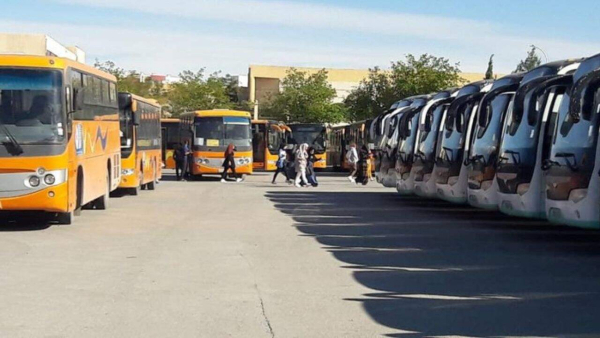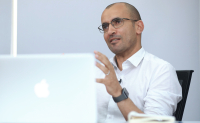The Algerian government has decided to leverage digital technologies to solve the country's transport issues. Last month, the Minister of Transport announced the launch of a new electronic platform interconnecting more than 40 public transport services.
Algeria’s Minister of Higher Education Kamel Baddari announced, yesterday, the launch of “MyBus”, a mobile app developed to allow students to monitor the university transport network in real-time.
The application -operational starting from October 23, 2022,- is a modern tool that aims “to improve the quality of university services [...] to create a conducive academic environment for students,” the Transport Minister said before the national assembly’s transport committee.
Since 2009, students have been complaining about mobility conditions, including disruption in university bus schedules and a serious lack of buses in some areas. Last April, a group of students enrolled at the University of Mouloud-Mammeri demanded the allocation of buses to resolve a crisis that has affected students for years.
With “Mybus”, the Ministry of Higher Education is trying to address some of the challenges pointed out, notably concerning the mobility of students living in rural areas. Initially, the app will cover ten routes and 26 buses out of the 5,749 dedicated to academic mobility. But, according to Minister Baddari, it will cover the whole university network before the end of the ongoing academic year.
“The app will give students [schooling in Algerian Universities] a real-time overview of the academic transport network and schedules,” he explained.
The new app is in line with authorities’ efforts to modernize the academic mobility sector to improve students’ living conditions and reduce public expenditures in that segment.
Samira Njoya
Fintech is currently the most popular in the African startup ecosystem. It attracts a significant portion of VC investments, encouraging tech entrepreneurs to unleash their creativity.
Fintra is a fintech solution launched, this year, by Senegalese start-up Orya Technologies. It helps employees face urgent needs by allowing them access to salary advances (up to 20% of salaries at a 6% interest rate) repayable within two weeks.
The fintech solution -which aims to help employees serenely go by their usual duties while waiting for the next payday- was developed as an answer to the challenges faced by employees when they exhaust their earnings before payday. Instead of wasting their time on paperwork all in a bid to collect bank loans repayable with a 12% interest, or turning to usurers, workers can simply apply for Fintra loans.
According to Oumar Diallo, founder, and CEO of Orya Technologies, loan requests are processed automatically but the startup keeps check to avoid disrupting companies’ finances.
Currently, the platform is in its beta phase. The phase, launched on September 15, 2022, is expected to be completed within two months. For the time being, the loans can be requested only by employees whose employers are enrolled in the program. For Oumar Diallo, the loan process is simple. Once participating companies set up accounts for each of their employees, those employees can request salary advances -via a mobile app- starting from the 15th of every month and receive the advances in their mobile wallets within one hour.
With Fintra, Orya Technologies targets an about XOF350 billion (US$520 million) market of 350 thousand workers (per company figures) in Senegal. It also targets the West African region and its four million former workers. To reach its goals, it bets on its main investor, Compagnie Générale sénégalaise d’ingénierie et d’investissement.
Adoni Conrad Quenum
The serial entrepreneur, who plans to build the Amazon of Africa, is based in Mali where he has established several tech companies.
Boubacar Biro Baldé (photo) is a Guinean computer scientist and tech entrepreneur. He is the CEO of Sodishop, an e-commerce platform founded in 2018.
“We sell everything, to everyone, everywhere,” Boubacar was saying in 2019 indicating the broad range of products available on the platform.
Although it was founded in Mali, it is also operational in Senegal and Côte d’Ivoire with over about 3,000 active buyers (Sodishopers) and more than 1,000 active sellers. It aims to scale to the whole of Africa, therefore, fulfilling its dream of being able to deliver even to the remotest areas on the continent. To attract the resources required for its ambition, it enrolled in the MEST Africa Challenge, launched on August 5, 2022. It made it to the regional round awaiting the continental round, which will entitle two winners to a check of US$50,000.
The CEO is also the principal manager of Sodifood, a food products’ sales and delivery platform he founded in Mali in 2020. He also leads iGandal, an e-learning platform he founded in 2020. Also, since 2015, he is the CEO of Technologie House, a tech company specializing in digital security, software, and website development, among others.
His entrepreneurial career builds on the experience he acquired during his professional career which started in 2009. That year, he joined JIU HUA Technology as the technical and after-sales service manager. The following year, he was hired by IT equipment and services provider SOMATI in Guinea and at the same time founded the social network Africa60. In 2013, SOMATI sent him to Mali as the company's director in the country. He remained in that post until 2015 when he launched Technologie House, kicking off his entrepreneurship career.
Melchior Koba
The platform is the result of important reforms announced by the government earlier this year.
Last Friday, Niger launched its national portal for unified access to digital educational resources. The platform, dubbed Edu-Niger, was inaugurated by the Minister of National Education, Prof. Ibrahim Natatou (photo, center). It aims to improve the quality of education and enhance planning and management.
According to Prof. Ibrahim Natatou, this major platform is one of the digital projects already undertaken by the government. "The portal integrates an intranet messaging system and also allows users to request leaves or permissions without [wasting time] going from one office to another with the [written] request,” he said.
"Edu-Niger" was set up to correct certain flaws in the education system such as the lack of information and reliable statistics on the sector, slow administrative procedures, and the lack of communication between actors, partners, and parents. It offers several services allowing parties to complete processes to create public and private schools, transfer students from one school to another, create school canteens or take part in two public examinations (BEPC and BAC).
Its library open to the public allows access to educational resources (annals, tests, vignettes, various exercises, capsules, guided tours, etc), and administrative resources (communiqués, decrees, decisions, etc.).
The platform is a result of the Niger-LIRE project (Learning improvement for results in education), an initiative of the Nigerien government financed by the World Bank to the tune of US$140 million. It is part of the overall strategy to digitalize the whole education system.
Samira Njoya
To increase economic activity in the country, and revive its Covid-19-affected tourism sector, the Namibian government will implement a new initiative to attract professionals.
Last week, the Namibia Investment Promotion and Development Board (NIPDB) launched the Namibian Digital Nomads Visa (DNV) to welcome “smart tourists” to the country. The move aims to capitalize on the country’s digital assets to boost the tourism sector, which contributed 61.3% to GDP since August 2022.
Speaking at the launch of the Visa, Nangula Uaandja, CEO and chairperson of the Namibia Investment Promotion and Development Board, said the new visa aims to unlock opportunities that will improve the population’s living conditions. "We have identified that there is an opportunity to attract and gain economic benefit from people who want to work, live and travel in Namibia, without absorbing Namibian jobs," he said.
The Namibian visa for digital nomads is valid for six months and can be granted to any national or international individual. According to the NIPDB, applicants must meet several criteria, including proving their monthly income is equal to or exceeds US$2,000 and justifying health or travel insurance to cover risks during their stay in Namibia.
The country's other digital assets are clustered in a digital ecosystem conducive to remote work, although Internet costs are still very high in Namibia. In its report "Worldwide mobile data pricing 2021. The cost of 1GB of mobile data in 230 countries," Cable.co.uk ranks Namibia 49th in sub-Saharan Africa estimating that 1 gigabit (GB) costs US$22.37 in the country.
According to DataReportal, Namibia’s internet penetration was 51.0% in early 2022. “Ookla’s data reveals that the median mobile internet connection speed in Namibia increased by 5.91 Mbps (+42.3 percent) in the twelve months to the start of 2022,” it adds.
In addition, Namibia has a high e-government development index (HEGDI) and is ranked the 6th African country with the highest level of public service digitization.
By launching this initiative, Namibia becomes the 4th country in Africa to offer this special visa after Mauritius, Seychelles, and Cabo Verde. According to 2021 statistics from "A Brother Abroad", there are about 35 million digital nomads in the world, representing a global economic value of US$787 billion.
Samira Njoya
The platform was launched earlier this year but, it has already secured 7-figure financing to get its revolutionary real estate project off ground.
Partment is a digital solution developed by an eponymous Egyptian startup. It allows users to buy second homes or part of them at attractive prices. The startup, founded by Nadim Nagui, Ahmed el Raggal and Chinmaya Das in 2022, has completed a US$1.5 million funding round to improve its infrastructure platform and deploy its minimum viable product (MVP).
By rolling out the beta version of its platform, the startup aims to gather enough user feedback to validate the project and the product before starting a lengthy and expensive development. "Partment is a new concept in Egypt and we believe it will change the way people buy and use real estate in the local and international market," said Nadim Nagui.
On the beta platform, users (upon registration) can browse the list of houses located mostly in vacation destinations and invest to either become the owner or co-owner of the desired property. When there are multiple co-owners for a property, the platform’s smart booking system sets a quota of days when so or so co-owner can use the property based on the amount invested and the number of co-owners. “Every co-owner has 41 nights of unbiased and algorithm-powered quota,” the startup explains. Co-owners can also sell their rights (or fractional ownership) in a property when they no longer need the property.
The proptech hopes it will quickly conquer Egypt and expand in the subregion thanks to the funds raised last September. "Aside from the financial support and expert advice, their trust in our business model will help us achieve our short-term and long-term goals and scale our business to the next level in Egypt and across the region," Nadim Nagui indicated.
Adoni Conrad Quenum
He is a computer scientist by training. After a fulfilling national and international career, he has developed several tech solutions catering to needs in several business segments.
Onyeka Akumah (photo) is a Nigerian tech entrepreneur specializing in transportation, agriculture, real estate, and media. He is the co-founder and CEO of Treepz, a shared mobility startup. The startup, formerly known as Plentywaka, was born out of a desire to make travel more comfortable and safe after an unpleasant experience the tech entrepreneur had on a public transport bus in Lagos.
Treepz was founded in 2019, in Nigeria. Some three years on, it is already present in Ghana and Uganda with more expansive ambitions. In November 2021, its CEO told TechCrunch that it was planning to expand further in East and West Africa. We are also really interested in Ethiopia. So the same thing we were doing with Ghana, across Ghana to Togo and Benin from Nigeria for the West African region. So next year, we will consolidate on our positions on East Africa and West Africa and start collapsing in on sub-Saharan Africa,” he said.
Before embarking on the Treepz adventure, the CEO had co-founded agtech startup Farmcrowdy, in 2016. He led the agtech as the CEO (until 2021) and board chairman (until March 2022). In 2020, he also co-founded the crowdfunding platform Crowdyvest, which he ran for a year before selling it in 2021. Six years earlier, in 2014, he co-founded the Nigerian news aggregator QwikGist.com which he also sold six months later.
Since 2019, he is a mentor for the business incubator Founder Institute. He is also a mentor, since 2021, with investment company Techstars. He started his professional career, in 2006, working as a UI and web developer for CITzar Limited. In 2007, he was hired, as a digital content developer, by Content Digital Solutions Ltd. Months later, he became a webmaster for the British Council.
In 2010, the financial firm Deloitte appointed him as e-marketing coordinator for the company in Ghana, Nigeria, Gambia, and Kenya. The same year, he joined the Nigerian online travel agency Wakanow.com as an online marketing manager. In 2012, the online shopping marketplace Jumia Nigeria appointed him as marketing and partnerships manager before he joined Guaranty Trust Bank as head of online and mobile marketing.
From 2011 to 2013, he was a senior consultant for the digital management company Anozim Group. In March 2013, he joined Konga Online Shopping as vice president of marketing before assuming the position of chief commercial officer at travel agency Travelbeta.com in 2015.
Onyeka Akumah has received several awards for his works. In 2015, he was named Digital Marketing Person of the Year at the Nigerian Technology Awards. In 2017, he was named on the West African Youth Confederation’s list of the 100 most influential under 40 West African individuals and the Westerwelle Foundation’s list of the top 25 young founders.
In 2018, he was named the Tech Entrepreneur of the Year at the Nigeria Technology Awards before being crowned Entrepreneur of the Year 2019 at the 2020 GAGE Awards. In 2019, he was named on The African Report’s list of the 100 most influential Africans. Onyeka Akumah also made it to the African Leadership Magazine’s list of Persons of the Year as the African Agricultural Champion of the Year 2020. He was even featured in Vanguard Newspaper's list of Nigerian CEOs under 40 years in 2020.
Melchior Koba
The agreement is the second cooperation activity carried out by Microsoft in Nigeria this year. In March, it announced the opening of its Africa Development center and Microsoft Garage in Lagos.
Global tech giant Microsoft will train five million Nigerians in digital skills. A memorandum of understanding was signed to that effect by Digital Minister Isa Pantami and the American multinational last Wednesday.
The agreement was signed on the sidelines of GITEX 2022, the Global Innovation Exhibition which opened on October 10 in Dubai, United Arab Emirates. “[...] This new offer by Microsoft will go a long in achieving our dream of a digital Nigeria,” Minister Pantami commented.
"We value action once agreements are signed; we will ensure immediate commencement of the implementation. [...] We will continue to provide enabling environment and ensure that our regulatory instruments are developmental and flexible for Microsoft and other businesses to flourish," he added.
With an estimated population of 219 million, Nigeria is now the largest Internet market in Africa. Its very young population, renowned for innovation and creativity, has taken it to the forefront of innovation in Africa. As of January 2022, Africa had a total of seven unicorns, including five from Nigeria. For those reasons, the country attracts partnerships like this new MoU.
According to the minister, under the MoU, one million job seekers will be trained in the most relevant digital skills, while 1,700 master trainers will be upskilled and 200,000 learners certified. More than 5,500 developers will also learn how to leverage Microsoft Power Apps to build tech solutions under the Global Power Platform Bootcamp.
In addition, through the MoU's African Transformational Skills Portal, two million Nigerians will benefit from free digital skills that will improve the way they work, create employment opportunities and increase productivity. According to Microsoft representative Deen Yusuf, the initiative will create at least 7,000 jobs in Nigeria.
Samira Njoya
According to WHO, “every day, approximately 830 women die from preventable causes related to pregnancy and childbirth” and 99% of the deaths occur in developing countries. To prevent such deaths, in Senegal, a startup has developed a maternal health information platform.
Doom Yaye is a digital platform developed by an eponymous Senegalese startup. It allows new and expectant mothers access to maternal health information.
The platform is accessible only via its web interface where its blog posts inform on every topic related to pregnant and breastfeeding women. The posts highlight the various phases of pregnancy and what expectant women can expect during those phases. They also indicate the various development phases and expectations from childbirth to the baby’s eighth birthday.
Doom Yaye also has an online shop where users can buy baby items like clothes, shoes, books, toys, etc. It also allows parents to rent childcare and leisure items such as baby walkers, bathtubs, dishes, and high chairs. The rental period can go from 48 hours to six months and the start-up emphasizes that all rented items are disinfected.
To read maternal health information, users need no account. However, they need to register when they are moving to make purchases or rentals. In 2022, Doom Yaye won the national edition of the Orange Social Venture Prize, receiving a XOF5 million (US$7,405) check and validation for participation in the global round where it will compete with 17 other African and Middle Eastern countries.
Adoni Conrad Quenum
Together with his friends, who are also investors, he has helped many tech entrepreneurs in Africa and the Middle East gain access to funding. He is now back to his passion: tech entrepreneurship.
Ziad Mokhtar (photo) is an Egyptian venture capitalist and tech entrepreneur. He is the co-founder and managing partner of venture capital firm Algebra Ventures, founded in 2016 with Tarek Assaad and Karim Hussein.
By partnering with bold and resilient entrepreneurs, Algebra Ventures allows the creation of ventures that can have strong positive impacts on residents in Africa and the Middle East. Through its first fund, Algebra Ventures financed several startups -including Elmenus, Trella, Eventtus, Orcas, and La Reina- earning Ziad Mokhtar a spot on the board of the funded startups.
In September 2020, Mokhtar announced his withdrawal from the venture capital firm’s decision-making circle, remaining just the managing partner of the first fund. He aimed to renew his passion: tech entrepreneurship.
“Some might think that walking away from Algebra, given where it is now heading, is foolish. I sometimes thought that myself. But as foolish as it might be, I hope it sets me on a path to discover equally meaningful success,” he said that year. Months later, in July 2021, he founded a tech startup baptized expeditions.tech.
About twelve years ago, when he graduated from the University of Alexandria, he assumed a position as a software developer at Unilever (he left in 2003). Concurrently, he co-founded eSpace, an IT consulting firm he managed till 2006. In 2007, he was a product marketing intern at Yahoo. Then, the following year, the tech entrepreneur became an associate at McKinsey & Company in Egypt.
In 2017, while he was managing Algebra Ventures Fund I and sitting on the board of some 15 startups, he was appointed partner of Ideavelopers, the venture capital arm of financial service company EFG Hermes.
Melchior Koba
More...
Last August, in Algeria, Emmanuel Macron and Abdelmadjid Tebboune laid the foundations for enhanced cooperation between France and Algeria in digital entrepreneurship and innovation. The memorandum seems to be one of the results of that groundwork.
French Development Agency AFD and state accelerator Algeria Venture signed a memorandum of understanding, last Monday, on the sidelines of the visit of French Prime Minister Elisabeth Borne (photo, left) to Algeria. The memorandum reflects the two parties’ will to cooperate for the implementation of the Algerian government's strategic plan to develop the local tech ecosystem and strengthen interactions between the French and Algerian ecosystems.
According to Sophie Aubert, FAD country manager in Algeria, the aim is to "develop cooperation activities aimed at supporting the initiatives of Algerian incubators and accelerators nationwide. “
“We want to network actors of the Algerian and French start-up economy through field initiatives. We also want to develop joint initiatives -including knowledge production, and training programs- to support the Algerian startup ecosystem and, and its interactions with the French ecosystem,” she added.
The memorandum comes after French President Emmanuel Macron’s friendly visit to Algeria last August 25-27. It is in line with the startup/youth section of the Algiers declaration for a renewed partnership that encompasses all the major bilateral cooperation areas the two countries want to develop.
“We want to work while integrating a France-Algeria-Africa approach. We notably want to mobilize Proparco [the French development finance institution, ed. note] via its subsidiary, Digital Africa. Algeria has a developing ecosystem so, the aim is to enhance cooperation between the AFD and Algeria Venture for a common approach that is rewarding and profitable to every party,” Sophie Aubert indicated.
Muriel Edjo
In its bid to develop the Cabo Verdean country’s digital economy, the government has financed several projects in the framework of the "Cape Verde Digital Transformation Agenda".
The Red Cross of Cape Verde (CVCV) will digitize its social games, including lottery, lotto, and joker to raise more funds for its humanitarian projects. It presented the project to the Cabo Verdean government last Tuesday, October 11.
According to the CVCV president, Arlindo Carvalho (photo, left), the said project is the result of a strategic plan that places a special emphasis on new technologies to address humanitarian issues. Many novelties will be introduced, he added. They include the creation of a digital platform.
The digital transformation plan will end logistics hurdles by allowing players to place bets on the social games online, via their mobile accounts. Therefore, the CVCV will no longer have to transport physical bulletins before players can play and place bets.
The initiative will allow the institution to raise more resources for its social and humanitarian projects in Cabo Verde. The CVCV also plans to launch a continental platform and later partner with global gaming platforms.
The project, which is expected to be completed by the first quarter of 2023, is in line with the government’s ambition to transform the country into a digital hub. According to Pedro Lopes (photo, right), Secretary of State for the Digital Economy, the country’s investment in digital projects like the social gaming platform is aimed at stimulating economic growth, expanding opportunities, diversifying the economy, and improving the delivery of quality services in the national digital economy.
Samira Njoya
Competition is fierce in the start-up market in Africa. Tech entrepreneurs offer various solutions to facilitate residents’ living conditions in several sectors and areas. In Ghana, this start-up wants to conquer several sectors.
ShaQ Express is a digital solution developed by a Ghanaian eponymous solution. It allows users to use a range of services including e-commerce, food delivery last-mile delivery, and e-pharmacy.
The solution has a mobile application (available for Android and iOS devices), which gives users access to all the services offered.
The startup also allows users to become sellers or couriers. For that purpose, they need to register an account by providing the usual information. Couriers are usually approved fast and then, they are free to approve or reject any delivery or errand they are notified of.
Sellers on the other hand will have to wait for a call from a ShaQ Express agent to activate their accounts. They then receive hands-on training on the various ways to sell through the application once integrated. Once added to the platform, they receive order notifications and, if the products ordered are available, they can accept the orders, package them and wait for a ShaQ Express courier to pick them up for delivery.
The Android version of the mobile application has already been downloaded more than 5,000 times on Playstore. The startup has been selected along with 5 other Ghanaian startups to take part in the MEST Express accelerator program organized in partnership with Mastercard Foundation. The program will last 20 weeks and each of the selected startups will receive a check for US$5,000.
Adoni Conrad Quenum
In major cities, waste management is a challenging task, particularly in Africa. The challenges led local entrepreneurs to implement tech solutions to facilitate the task.
Scrapays is a digital solution developed by an eponymous Nigerian startup. It allows households and firms to sell their recyclable materials. In fact, through the digital solution, the startup connects users -businesses and households namely- with its partners who register the users, collect the materials, and sort them. The agents then sell the sorted materials to Scrapays.
To reach even users without internet access, the solution is accessible via a USSD code. Anyone can then register either as a collector, an agent, or an individual seller and discuss waste management issues.
The startup claims it collected over 150 tons of solid waste in 2020, generating US$60,000 from them. The startup expects to earn more in the coming years with the creation of its service that allows individuals to set up and develop their waste recycling micro-enterprises. It is among the five startups selected for this year’s edition of the OceanHub Africa accelerator program.
Adoni Conrad Quenum














